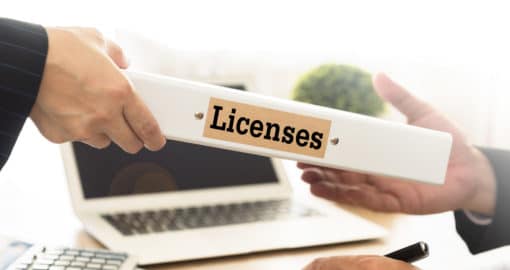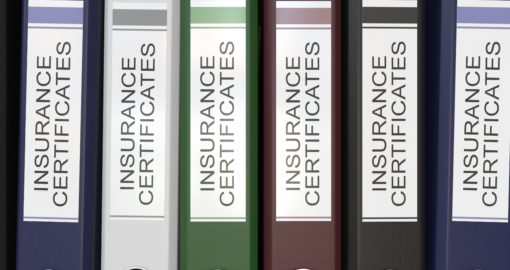Call Us Today (877) 943-0100
Trade License Tracking For Your Contractor Network
License Monitoring | April 26, 2021
It is easy to get lost in the world of licensing and license requirements since each state has different rules and regulations managed by different departments or divisions across the state. Add the fact that not all states even issue licenses and you may find yourself lost when trying to understand licensing at a county or city level. When you start delving into the license requirements, you will find several different terms are used, such as licenses, registrations, and certifications.
All that said, there are some common topics that exist within the requirements and terminology. Understanding these common themes will help you answer the question: “Is a license required in this situation, or not required?” The key to answering that question is simplifying the process. Keep reading to learn more.
The Difference Between License, Registration, and Certification
Before jumping in, you will need to recognize the terms that are used when you talk licensing. License, registration, and certification are sometimes used interchangeably amongst the states, but they are not compatible. You will need to know the definition behind what you are looking for and the differences between them.
License: When we refer to licenses, it is a reference to trade licenses. These qualify a person or a company based on their skills and ability to perform a specific service, and not to be mistaken with a business license. Many cities or counties require a business license, which is needed to operate a business in a certain area. Although this is a requirement for most businesses, a trade license is where you will have more exposure to risk.
To obtain a trade license, the company or individual must meet a variety of rigorous qualifications and requirements such as education, business insurance, bonds, work experience, or a professional reference within the trade. The education and work history needed is typically related to the field of study.
Registration: A registration is a minimum requirement to operate a business. A registration does not qualify a business or someone to perform a certain type of work. It is typically obtained by paying a fee to operate.
Certification: Most certifications are not required to perform work unless it has an environmental, health or safety impact, such as refrigerant, lead, asbestos, or mold. These are typically issued by an environmental agency such as the EPA or trade association but can be issued by a private entity. Otherwise, most certifications show that you have additional specialized training and does not come close to the overall skills and requirements for a trade license.
Bond: As mentioned above, a bond can be required when obtaining a license. A bond protects all entities involved due to a contractor failing to complete a project, meet requirements, etc. This is a way to ensure bills will get paid pertaining to a construction project. An example of this is the state of Minnesota, which does not have a mechanical state license requirement; however, businesses must file a $25,000 mechanical contractor bond with the MN Department of Labor and Industry.
Of the four, trade licenses are by far the most effective way to guarantee that you hire a qualified business or individual to perform work or services for you. By knowing which licenses are required and obtaining proof, you minimize your exposure to risk by confirming that you are operating legally with a licensed professional. Not only will this ensure a high quality and level of work but will protect you if there is a dispute. A contract is enforceable only with a licensed contractor.
When working with states and their license issuing boards, you will need to know that you are looking for a trade or specialty trade license, even if they are using different terminology. Educating yourself will make the difference when conducting contractor work in your location.
Questions to Ask When Determining Which Licenses to Track and Monitor
The challenge when confirming if someone is a legally licensed professional is that the requirements vary, and it can be easy to get lost in the intricacies. As a general rule, there are some basic questions that you can ask about the contractor to simplify the process and can be the difference on whether a license is required or not. Being prepared with the answers to these questions will help you when researching if a license is required or not.
Where is the work or service to be performed?
Licensing needs are determined by where the work is being performed, not where the contractor’s business resides. This may mean that multiple licenses may be required if they perform work in multiple states, counties or cities. This is especially true where states are highly concentrated such as the northeast where it is common to cross state lines or the contractor resides near a state border.
What type of work or products are involved?
Knowing the type of work and any products will help narrow your search for a license requirement. It is important to know that some of the specialty trade licenses will typically qualify a contractor to perform any work involved in the scope. For example, an HVAC contractor will be able to perform limited plumbing and electrical work in the installation or repair of an HVAC system. Or a plumbing contractor, with the correct license, can most likely work on heating or gas because it involves piping which is the same basic skillset as piping for water.
Examples of where the type of work and product can make a difference on whether a license is required, and which type of license is required.
| Type of Work | Products |
| Heating, Ventilation, & Air Conditioning (HVAC) | · Warm air appliances
· Water heating heat pumps · Ventilation systems · Air Conditioning Systems · Refrigeration |
| Water Heating & Steam Fitting | · Water heaters
· Boilers |
| Major Appliances | · Laundry Appliances
· Dishwashers · Ranges/Cooktops · Refrigerators/Freezers · Ovens |
| Electrical | · Low voltage wiring
· High voltage wiring · Electrical Fixtures |
| Plumbing & Gas | · Piping
· Plumbing Fixtures/Apparatus · Natural Gas · Liquid Petroleum |
Will they be repairing or installing?
In some cases, repair work may mean a license is not required. If you have a contractor who is repairing a major appliance, most states do not require a license to perform this service. Some states are the exception, such as California who will require a license to both repair and install an appliance.
Requirements for installation licenses vary depending on the state, whether this is a new installation versus a replacement of an existing appliance, the level of the installation such as “plug in” connection vs a hardwire, or connecting to a potable water system.
Will they be altering/adding new lines or piping? Or simply connecting and disconnecting?
Most states require a license if the electrical lines or piping for plumbing are altered or added. For example, an electrical license is usually required if you need to run new wire or convert an outlet to a hardwire. But if you are simply swapping out a light fixture, no license may be required. If you run new piping to a sink that has been moved a license would most likely be needed. Yet, if you change out the faucet, you are simply disconnecting and reconnecting to existing piping and no license may be required.
It is worth noting that gas connections can be the exception, especially if it involves Liquid Petroleum (LP). A gas license, plumber, or pipe fitter may be required in these cases.
What will the cost or average cost of the project be?
Some states put a monetary value on whether a license would be required or not. For example, in Louisiana if a Home Improvement project is valued, including labor and materials, at more than $7,500, then the contractor must have a residential license or register to perform the project.
If you have a contractor network that you use frequently to perform work and are not collecting the license for a specific job and site, consider an estimated average cost of work to determine if a license is needed in a certain area.
Is the work commercial or residential?
Different licenses may be required for commercial work versus residential. It is not uncommon for commercial work to have different requirements from residential. Some states only monitor commercial work and may leave the residential work to the county or city level, i.e. Ohio.
Are they a contractor or subcontractor?
If they are a contractor and subcontract out work, then the contractor will most likely need a general contractor’s license. In these cases, the subcontractor will hold the specialty license for their trade, such as an electrical or plumbing license. There are some exceptions, such as a building contractor which may be providing some of the building services but will subcontract other services. Their building contractor license is usually sufficient as a general contractor.
Keep it Simple
There are numerous classifications for licensing. You will find that there are contractors, masters, journeyman, apprentice, and other classifications for a particular license. Unless you are prepared to pay the cost to track licenses to that level and find you have a need from a risk perspective, then you will want to avoid drilling in that deep. It is best to determine that there is a certain license type required and collect and track at the contracted company level. For instance, if you have an electrical contractor’s license, typically there will be a master electrician who qualifies the company to provide services for that work. To make tracking licenses feasible, you will want to keep it simple.
To Sum it Up
To ensure the highest quality contractor is performing work for you and to make certain you are covered from a risk perspective, require that they hold the appropriate trade license in their industry. To confirm that they are required to obtain a license or have the right license for the job, you will need to know the actual license they are required to hold. To do this, you will need to understand what a trade license is and what the right questions and answers are when working with license issuing entities, regulations and statutes. It is best to keep the process simple to avoid getting lost in the details.
Contents are provided for information purposes only and should not be construed as legal advice. Users are reminded to seek legal counsel with respect to their obligations and use of PlusOne Solutions services.
About PlusOne Solutions
PlusOne Solutions has been an industry leader in the risk management field by specializing in compliance programs that meet the complex challenges of geographically dispersed contractors, vendors, and employee networks. PlusOne Solutions protects companies from possible financial, legal, and reputational risks associated with contractor and vendor relationships while creating safer work environments. To learn more, visit our website.
To receive these updates directly in your email inbox, sign up for the newsletter. Questions or comments? We want to hear from you.
9 Best Practices for Monitoring Licenses for Contractors and Vendor Networks
If you have ever found yourself in a position where a job...
Read More5 Trade License Tracking Benefits For Your Contractor Network
Licensing is one of those critical areas that can take a back...
Read MoreCertificate of Insurance Management for Small Businesses to Reduce Risk and Improve Compliance
PlusOne Solutions, a compliance and risk management solutions provider specializing in contractor...
Read More


